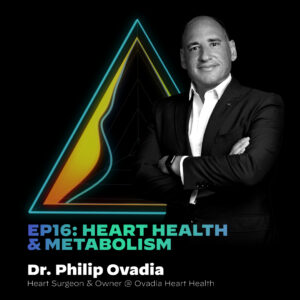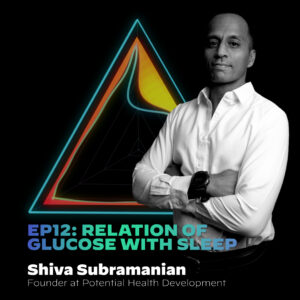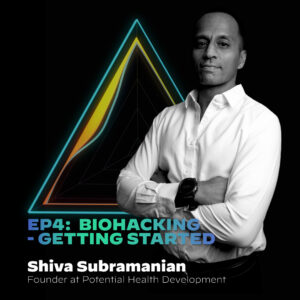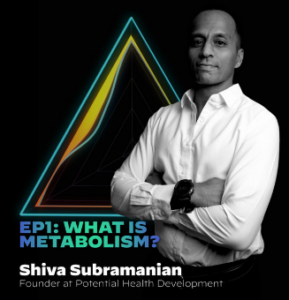Introduction Of Podcast
In this episode, find out how the vagus nerve plays an important role in your metabolic health. Mohit & Shiva discuss how the vagus nerve functions and simplify the complexities that surround the concept. Jump right in!
Timestamps
- (00:00 – 01:04) – Introduction
- (02:11 – 04:16) – What Is Vagus Nerve?
- (04:18 – 08:28) – Vagal Break and Vegal Tone
- (08:35 – 10:54) – Importance of Music
- (13:29 – 16:44) – Vagus Nerve, Metabolic Health & Insulin Sensitivity
Key Takeaways – Transcripts
Intro (Mohit): The nervous system of a human body is very complex. All its key functions are involuntary and there is no conscious effort by humans to pay attention to it as compared to, let’s say something like physical health for instance, which is like way more visible. So, we humans do have a tendency to not realize the importance of it and often overlook the work that the nervous system does which can’t be seen. I’m Mohit Kumar and in today’s episode we will talk about one of the key and extremely critical components of the human body, which is the vagus nerve. So, this nerve is responsible for the regulation of our internal functions such as digestion, breathing and certain other reflex actions such as coughing, sneezing, swallowing and vomiting. This is the chord connecting your primary and secondary brain. It’s up to you to decide which one is the primary one here. So, without further ado, let’s explore and know more about the vagus nerve and why the stimulation of it is critical.
Question (Mohit): When you think about lifestyle changes, you naturally think about things that look more physical in nature like lifting weights, moving around. But then when you think about how your body reacts to these things, your nervous system actually plays a huge role in how you interpret all of these things. And that’s often super or highly underrated element of how you view things. It’s sort of like an extension of our brain or actually you can say that it is our brain. In some ways it’s the network of our brain, but it’s often the fact that we feel that our body is the physical body of made up of tissues, muscles and brain is a separate element. The nervous system I think is usually one of the most ignored ones. Although like whatever we feel hear & see is governed by how your nervous system is actually built. Like touch completely in our system, right? So, on that, I think one of the most talked about aspects you also spoke about it is the point around the vagus nerve. It’s a favorite topic for many biohackers. We have seen a lot of companies in this space, especially in the red-light devices essentially sort of like, trying to activate your vagus nerve or basically improve your vagus tone, all of these things. So, first of all, what really is the vagus nerve and how does it actually affect your physicality or body or whatever? Basically lifestyle overall?
Answer (Shiva): Actually, the vagus nerve, I mean that’s like a question for like I suppose that’s a phenomenal nerve because it’s one of the longest ones that we have and it’s actually cranial nerve ten and it moves all the way from your brainstem and into all the visceral organs. The vagus nerve is interesting. Again, let’s just quickly, briefly describe it because then at least we have context of where we’re heading. So, the vagus nerve may be divided into two different elements as in a simple way of understanding right, it innovates the top part under your diaphragm. So, your diaphragm is where your upper organs are separated from the gut, around the solar plexus, but it actually slopes back and actually attaches to somewhere around the lower ribs, et cetera. Now, what makes the vagus nerve very interesting is that it’s myelinated, which means the faster fibers with the myelin sheets are on them, are on the top half and underneath the diaphragm, it’s not myelinated. It’s like an evolutionary nerve and it connects to all the organs, like right after the gut, the liver and everything else. So, it’s the nerve that’s getting all the feedback from all the organs. It’s 80% sensorial. So, all of this goes back into the brain from all the organs back up and then it also controls your heart rate and it’s a part of your parasympathetic system. The reason it’s so important is when people are talking about heart rate variability today and about how ready you are or the variability with your heart, the more variability you have, the more scope you have to deal with stress, the more flexibility basically the flexibility, right, the flexibility of the HRV? No, the less scope you have of variability, the more stressed you are. That’s when your autonomous system is on. It’s your sympathetic system that’s on.
Question (Mohit): Why does that happen? Like, why does the autonomous nervous system regulate or make your heart rate, you can say more regular in some ways.
Answer (Shiva): You want to know something phenomenal? There’s something called the vagal brake. It’s not that it makes your heart rate more. Imagine that your heart is always beating much faster than it is. It’s because of the vagus stone that the vagus brake, this vegal brake, is actually holding the heart rate back. So, what happens is actually the brake is released and that’s how the sympathetic nervous system goes ahead. The vagus nerve is like a break on the sympathetic system. It’s so funny that we think it’s modulated. It’s actually holding it back. There’s actually something called a vagal brake. So that’s why we have two different modes, right? You have rest and digest, I mean, in broad spectrum and the ability to act. In the sympathetic nervous system, there are two different functions that you modulate right throughout the day. The faster able to modulate in and out of that, the more recovery you’re able to have, the less stress you’re able to have and the better you’re able to manage your biochemistry. Because as you can see, everything from your brain stem going all the way down into every organ is controlled by this vagus tone, as you would say. Now, here’s the amazing part of it. When people are stressed, they figured out that there’s something called the polyvagal theory. And this is mind blowing stuff because they figured out that even what you hear, changes. So let me give you this. If you’re stimulated and there’s fear the way in your mid ear there are two small muscles, and these muscles actually relax the tempanic membrane in such a way that you hear steps in low tones. So, when you hear jazz music, it’s low tones. And that’s all to do with fear, isn’t it? Now, to calm the vagus note down is the opposite. There’s something called prosodic. It’s when a mother is speaking to a child or you’re speaking to your dogs. Have you noticed that you have high modulatory voices to calm them down? Right. Now that’s prosodic. Now that itself, the way it sounds. The tone actually also relaxes the vagus nerve.
(Mohit): Now, the way music programming also works is on the same principles.
(Shiva): Probably it would be, right? I mean, everything affects us. Everything affects us. This is what I was telling you about our vestibular system and our visual system. So, when you’re talking about vagus, because you know what? The neurology is so exciting because the vagus nerve is in your brain stem, but it’s next to the facial nerve. And here’s the other thing. Have you seen people are not expressionless when they’re stressed, especially the top half of the face. You’ll see no expressions on the top half of the face because it’s next to the facial nerve. And all of this is like sort of frozen. I mean, if you now think about it, when we’re getting visual cues from people, a lot of it has got to do with the face and modulation. That’s where the nonverbal communication is happening. Right. So sometimes when you feel people are off it’s because they don’t have any expressions on the top half, they’re giving you that’s a threat response. Right. So all of that is a part of the vagus nerve. Wow. So that’s why we have to move the face. If you notice your face don’t have expressions, the bottom part may have, but the top part doesn’t, right? I mean the facial nerve and exactly. Even the tones that you hear change. Why? Because if you’re growing through a dangerous area and you can hear footsteps at the back, it’s a low tone. So, your whole ear under threat is geared to listen to low tones and begins to not pay attention to other things. It’s like a predator response that probably being hunted. Exactly, but that’s what I’m trying to say. So, when you asked me about the vagus nerve is, is just beginning to scratch the surface, right? So, everything to do with your gut, everything to do with it. That’s why anybody who’s in a chronic stress suddenly doesn’t have tone in the gut. So irritable bowel syndrome, constipation, gut health, other issues over there.
Question (Mohit): What do you really mean by the tone here?
Answer (Shiva): In this case, when you say vagal tone, it means the amount of stimulation maybe the nerve is getting. So, like if I wanted to increase vagal tone because we know it’s connected to the heart, exhalation helps a lot. This kind of exhalation, it tells us so much about yoga, doesn’t it? Or all the breathing exercises around the world, what the Tibetan monks do, why we chant, why the Om is so powerful. All of that is vibrating and all of those humming and high music. Why do people have music? Right? How does that affect all of this? Music is probably one of the most underrated.
(Mohit): I mean, it’s definitely not a part of your utility lifestyle, right? Why did people discover music? Why do people invent music in the first place? I think the fact that it’s not a part of your lifestyle, you don’t need it to survive. But then music got created as a way of living essentially, right? That’s really interesting, that it definitely would have been something that my instinct people would have discovered, that this does affect the way they live their life, whether they are listening to music or they’re seeing themselves listen.
(Shiva): It’s interesting that the kind of music that we listen to, the higher female voices, the tones change when we want to relax. I mean, you got it on the Ultrahuman app, you got all the sleep ones, and all the tones are all prosodic. And then if you look at what you want to listen to before you go to play a sport or you want to play football or whatever it is, you’re actually switching into a different state. Maybe that’s metal. It’s very intriguing, but you’re not doing this consciously. It’s just something that, you know, you want to bring this kind of sensation so you’re able to tune in and tune out of those sensations and that’s what makes it just unbelievably cool. Look, we’re just catching the surface on this one, but again, with a heart rate variability and such like that, this is where you’re able to get some kind of introception and feedback on the way you’re able to influence this, right? So that’s why we have biofeedback today. You have other systems. There’s some amazing work done on the Earth by I think it’s called the Listening Project protocol, where this Dr Stephen Borges, he’s an expert on this polyvagal theory and they’ve put out so much of information on listening, I think it’s him and Dr Lewis. So, all of this is already available, but like I said, all this amazing plethora of information available and easily applicable, and that’s what makes this kind of biohacking sexy for me, because it’s accessible to everyone. It’s there on your app. You can go and listen to these tones, and you know it’s going to bring it down because it’s cooler over here, because, you know, you’re like, almost excited because you’re already in the pursuit of it. It’s actually summing up everything that we’ve done together, isn’t it? I mean, it’s sort of like saying, look, I know I can relax. I got to get my periphery vision opened up. My gaze is soft, I’m able to widen my scope. I’m listening to these prosodic memories. I may be humming maybe at home you just meditated without even knowing about it. You can go from a top down or bottom up. It doesn’t really matter, does it?
(Mohit): Basically the natural environment already took care of these factors and probably we’ll have to unlearn a few things and relearn a few bunch of things which we already know instinctively. I mean it goes beyond biohacking. It’s actually in some ways understanding your biology, understanding environment around you, just that itself could actually make a huge difference in terms of how people actually not just treat their body but also treat other people and the environment around them.
(Shiva): It’s funny you said to other people the vagus nerve has got a huge response to community and social angles because face tone is how you actually interact with humanity at large. So, you could get everything right and hack yourself to death but not have a community and that could be the one thing that takes the tone off, right? It’s amazing because they actually did some research and you’re like if you hit me and you turned around and walked away I would be pissed with you and probably will end up in a fight. If you walked into me, smacked me and said I’m so sorry, what do you do with the tone? It’s amazing. You’ve already neutralized it. I accept it and we may be playing a sport and the minute you say that it’s done because you appeal to me saying it’s not intentional. You’ve given me the cue with your face and my Vagal tone is satisfied and we are not going to get into a sympathetic drive. The vegal brake still stays on and suddenly so we have to look at this contextually as that the people that we surround ourselves with I have as much to do with our Vagal tone than what we have. So, your spot on when you actually said that our community, our social realm, our interactions, all of it influences everything, right, the way we see and that’s what I wanted to bring to the fore. I’m saying that look, we have all the tools, we are the greatest wearable we have and hack that. No, I mean just understand it.
Question (Mohit): Yeah, probably in the meta verse we’ll be able to pick the type of people we want to stay close to. But yeah, I think you look at the way for example is Warren Buffett, right? The way he plays blackjack all day long and lives normal life, meets friends, talks about life, has these long days where he does not talk about business but then ends up being one of the most successful people on the planet. Just tells you like what a chronic low stress cash would do to you or chronic living in your natural environment can do to you. That’s really cool. But yeah, I think when you consider this from, I know that this metabolic health is definitely related to how you handle stress but is there a direct correlation or direct relation of the vagus nerve to your metabolic health? If you think more from an actionable perspective, like regulating the vagus nerve tone, would that directly affect your state of metabolic health?
Answer (Shiva): 100%, because every organ is going to be affected by it. And if you’re interested in digest, once your functionality of every organ improve your liver. Look, I think a lot of the problems of metabolic health as we know, whether it is a increase of insulin because of stress, because of, yeah, let’s say insulin sensitivity, but anything because, look, there are many reasons why insulin could be up, right? Inflammation, cortisol, glucose, and then you have this huge growth factor that’s ravaging your system. The point over here is like when you begin to manage it, you’re going in a parasympathetic state, you’re allowing your time to recover. I think what it is, is that you’re not not going to be stressed. I think it’s a part of humanity, but we have the tools to deal with it and negate the problems. The issue is that we are not able to see that as a part of that same continuum. We’ve become so good at one thing, which is the response, which is to be on all the time, to be stimulated all the time, that we forget that we have to take care of this other element, which is the recovery and digest. And look at it. It’s all the things that people don’t want to do, really, isn’t it? It’s to slow down, to increase your scope, relax, breathe. It’s not rocket science and have enough of time to relax. If you think about it. If I’m going to relax and I’m going to be looking at a TV all night and that’s my idea of relaxation, it’s good, there’s no problem, no judgment over there. But not how our body was programmed because that’s still stimulus, right? Yeah. You’re still watching something; you’re responding to it. There are stones over there. If it’s an action movie, it may be driving a sympathetic up just by the tone. And if you have all these flashes and bangs happening, what’s happening to your eyes?
(Mohit): Yeah, but maybe that’s still better than living a stressful life, I guess.
(Shiva): Absolutely. That’s I’m just pointing out on the continuum on where that goes, right? It’s not good or bad. Yeah. It’s just that you’re talking about the vagus tone and say like how much you want to influence it, what it does, right? That whole continuum.
Question (Mohit): If you just talk about the sensitivity, body sensitivity towards insulin, the stress and hence the vagus nerve directly affect how insulin sensitive you are?
Answer (Shiva): Breathing, I’m sure, because it’s going to bring it down. Make sure that your body is in a state where it’s not so primed over a period of time. But you’re going to take twelve weeks of doing this before you see a result, right? That’s the problem. It’s not like, hey, I’m going to meditate or I’m going to take a break from life or whatever it is, and I’m done. But you know what’s really interesting? Here’s a good one for you. Almost every single person who’s had the Cyborg on, who’s gone from Bangalore off on a holiday, they activate the vegal system because they’re outside doing something. I think even you weren’t you at the beach recently? It’s really interesting, right? You don’t have to do anything, you just got to be here. The sea, you’re already have a vast expanse of the horizon. Your water is playing whatever it is. If you’re in the ocean, you’re relaxed. You don’t have your everyday environment. And what happened to your glucose? It’s an automatic. You don’t even have to do rocket science. Just change your environment, put yourself into a natural habitat and watch how your vagal tone changes.
(Mohit): The beach is really interesting. It’s both peripheral vision as well as grounding. Plus, basically the fact that you’re hearing, it’s actually moderating you or actually optimizing you on multiple aspects, right?
(Shiva): Exactly. I’m saying you don’t have to do anything, you just got to change your environment. That’s why people go on holidays, right? What do you hear? I’m really stressed. I’m going to go on a holiday, and I need some time off. What do you do? Generally, if you end up in nature? You’re going to basically enhance your vegal tone. My point again is you don’t have to think so hard, right? It may be a weekend, it may be a walk in the park during a day, but all of that is going to still help, right? I’m saying because it’s everything you see, everything you hear, the way you breathe.Outro (Mohit): I hope that were able to understand and appreciate the complexity of the nervous system and derive actionable insights for optimizing your health. Write to us about the most hard-hitting part you found about our nervous system by tagging @UltrahumanHQ on Twitter and Instagram. Let’s start a dialogue. Don’t forget to share this podcast with your friends and family and let’s embark on this epic metabolic fitness journey together. See you soon.









